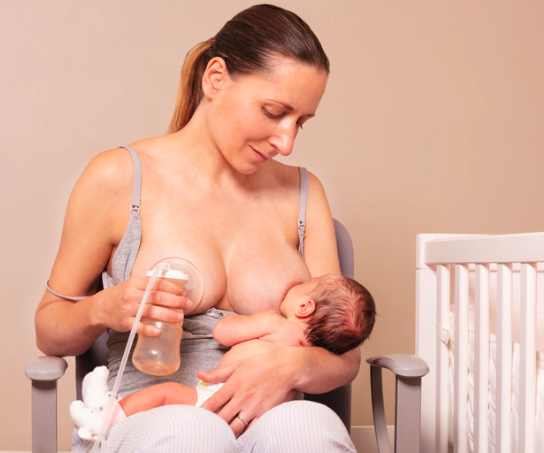How to maximise your chance of breastfeeding success
how to maximise your chances of breastfeeding success

by Steph Pope from Nurtured by You
During pregnancy, most women are fully focused on the birth of their baby.
How to care for them after their arrival into the world is often the last thing we consider until we realise that we are now required to keep the tiny baby in our arms alive!
There is much that you can do to get breastfeeding off to a good start if that is how you choose to feed your baby. From the moment they are conceived, your body is primed to breastfeed, you just nned to learn to trust it.
This is the low down on steps you can take to maximise your chances of breastfeeding success:
ANTENATAL HAND EXPRESSION AKA COLOSTRUM HARVESTING
Please note that antenatal colostrum harvesting is not recommended before 36 weeks and is only suitable for low-risk pregnancies. You should always receive advice from your midwife before proceeding.
Firstly, antenatal hand expression familiarises you with your breasts so you are able to understand your anatomy fully. Touching our breasts is not something that most women do on a regular basis, although we are supposed to for checking for lumps and bumps that shouldn’t be there. But it does mean that you are fully familiar with how your breast feels, where the ductile areas are inside of them (the milk making bit), and how you can use hand expression to get milk flowing.
Secondly, it allows you to practice expressing your milk – where to place your fingers, how much pressure to apply and the movement involved. This is something that you can use throughout your breastfeeding journey not just in the early days, but at any point you might need to whether that be weeks or months down the line.
And thirdly, it allows you to build up what we call an insurance policy, so that if your baby is unable to latch for any reason after they are born, you are able to give them your colostrum that you’ve stored away, rather than having to resort to formula. Some of the reasons why you may need to supplement your baby early on include trouble with latching, excessive sleepiness and low blood sugars due to gestational diabetes in pregnancy.

Additionally, if your baby ends up in the neonatal intensive care unit or separated from you in some way, you know that you have some colostrum available should you need additional amounts for your baby in those early days.
Colostrum is the early milk that is basically super food for babies.
It contains all of the nutrients they need, including antibodies that help them fight infection in those early days before your milk transitions to mature milk. It is important to note that some women are able to express lots of colostrum during pregnancy and others not a single drop. Either way, it doesn’t matter for milk production long term as colostrum will be there ready to go from the moment your baby is born.

Supplementation beyond the early days may be required for reasons such as Polycystic Ovararian Syndrome (PCOS), as this can impact milk production for some women who suffer from it, and likewise for insufficient glandular tissue (known as breast hypoplasis), which simply means that there is less of the milk making tissue and therefore building a full supply of milk may be challenging. Often the effect on breast milk supply of diagnoses such as these cannot be known until a baby is born and breastfeeding attempted. Hand expression alongside regular pumping with an electric pump once your milk has ‘come in’ can help build and maintain as much of a milk supply as possible, with the use of donor milk or commercial milk formula in addition if needed.
The transition process from colostrum to the earliest form of mature milk is initiated when your placenta comes away and takes around two to four days on average, although it may take longer if you experience induction of birth or Caesarean section due to the drugs used, which may impair the hormones needed for milk transition and therefore cause a delay.
The establishment of a sufficient breast milk supply to meet your baby’s needs relies on efficient and frequent removal of breast milk from your breasts.
This means feeding your baby regularly when they are showing feeding cues, at least eight to 12 times in 24 hours, although realistically it could be a lot more. Their tummies are tiny, so they require little and often rather than bigger feeding sessions. The same thing applies if you’re also exclusively pumping to provide your baby with the milk they require – you will still need to establish your breastmilk supply going forward through mimicking your baby at the breast which is easiest done using an electric breast pump. Breastmilk changes over time so that it is perfectly matched to your baby’s nutritional needs.
After the first few days breastmilk supply moves from being controlled by hormones, to a demand and supply basis. This means that the more milk is removed, the more milk is made. So, if there is any reason why this is not happening, your body will think that it does not need to make so much milk.
SKIN-TO-SKIN FROM BIRTH UNTIL AFTER THE FIRST FEED
The next thing you can do, and arguably the most important of all, is skin-to-skin contact with your baby from the moment they are born at least until they have had their first breastfeed. This literally means that the moment they enter the world, whether that be by caesarean or vaginally, they are placed skin-to-skin with you on your chest, close enough that you’re able to breathe in the pheromones released from the top of their head – which means no hats at any point whilst they’re in skin-to-skin contact with you – to help get the hormones flowing. These are Oxytocin, the love hormone and responsible for the milk ejection reflex, and also Prolactin the milk making hormone. You need both to be flowing freely to jump-start your milk production.
Newborn babies work through nine instinctive stages when they are born – primal instincts that have developed over millennia to optimise survival
(remember, we didn’t always have commercial formula milk as a backup plan!). These are described here: https://www.lllc.ca/first-hours-after-birth-nine-instinctive-stages. What we don’t want is for this process to be interrupted by checks on your baby or yourself that are not immediately required. This means waiting until the baby has fed for the first time before anything any disturbance takes place. You do not need to remember the stages, just that your baby needs to be given the space to work through them – in short this means NO HAT – baby stays naked in skin-to-skin contact with you (which also regulates their body temperature and heart rate), NO PAT – no one else is to hold the baby until they’ve had that first feed and no unnecessary procedures that take baby away from you, and NO CHAT – keeping interactions with others to a minimum and allowing you baby the peace and quiet to adjust to their new surroundings. Ideally, their palms would be left wet, as traces of amniotic fluid left on your chest from their initial exploration towards the breast will guide them back there for their next feed also.

It is perfectly possible, if your baby is healthy and well, for all required checks on yourself and your baby to be done whilst they’re still in skin-to-skin contact with you. In the absence of risk factors and medical necessity, there is absolutely no need for your baby to be separated from you at any point.
By allowing your baby to remain skin-to-skin and work through the nine instinctive newborn stages, you maximise your chances of breastfeeding success by allowing them to learn and imprint the location of your breasts and how they get to them as part of their primal instinct to feed.
EDUCATION, EDUCATION, AND MORE EDUCATION (PLUS SUPPORT)
As someone who has been working with new mums for the last five years, I can confidently say that the vast majority of the challenges that I help mums with could’ve been avoided by good quality education on birth and breastfeeding before their baby was here.
Often the biggest concerns I see among new mothers, are either related to pain during breastfeeding and/or perceived low breastmilk supply.
These are also among the main reasons why mums give up breastfeeding before they wanted to*. However, good quality antenatal education provides you with the knowledge of exactly how to hold your baby and latch them on so that breastfeeding is not painful and things do not progress to full blown cracked and sore nipples with a baby that is possibly not gaining weight sufficiently. That’s not to say that breastfeeding is never painful despite a good latch – in the early days, often the initial few seconds when your baby is latching on can be quite uncomfortable due to nipple sensitivity from hormones, but that should not last the entire feed. If it does then something is not right no matter how many people tell you that your baby’s latch looks good!
When it comes to perceived low breastmilk supply, often this is simply because normal newborn behaviour and breastmilk production isn’t fully understood.

They need to feed little and often, sometimes very often (hello clusterfeeding!) in order to establish and maintain milk supply, which if you’re not prepared for can really get you doubting your supply and ability to satisfy your baby with your milk alone.
It’s true that we can’t see what goes in when they’re breastfeeding which makes it hard to know that all is well and trust your body to do its thing, which underlines how vital it is to have an understanding of how newborns feed, to learn to recognise efficient feeding at the breast and the signs that they are getting enough milk. This will make all the difference to your confidence in yourself and your body’s ability to nurture and nourish your baby.
There are lots of wonderful courses out there that you can take before your baby is born that will teach you everything you need to know for those early days and weeks.
Look for those created by infant feeding specialists or those with specific qualifications related to infant feeding to ensure you’re getting all the correct info.

It is also essential to breastfeeding success that you know who to turn to if you need support with feeding your baby.
Your Midwife and Health Visitor may be able to help with less complex feeding challenges, but often it’s worth looking outside of the NHS if waiting lists are long and advice given is not necessarily breastfeeding friendly (such as the recommended use of formula without support to fix the breastfeeding issue that has meant supplementation is required). Lactation Consultants are typically the most highly qualified. Then you have Breastfeeding Counsellors and Infant Feeding Coaches who have also done extensive training in order to offer you support with feeding your baby. And then there’s peer supporters, who usually work on a voluntary basis and run groups locally that you can go along to in order to receive mum-to-mum support with feeding your baby, with sign-posting to other services when required. If you know exactly where to go to get the support if you need it, it makes life a lot easier.
Many Lactation Consultants and Breastfeeding Counsellors will offer online support these days too. So, if you find someone you like and trust, you don’t even have to be local to them to get support.
At the end of the day, the most important things you can do as an expectant or new mum is to learn to trust that your body knows what it’s doing and accept that you may need support (and go get it!). We have birthed the next generation for millennia now and our bodies have evolved to support our babies throughout the early days of life and beyond, yet that doesn’t mean that breastfeeding isn’t hard.
There’s no need to struggle through alone. Skilled support is often vital to breastfeeding success.
_
Reference: https://www.ncbi.nlm.nih.gov/pmc/articles/PMC4861949/

Visit Website
Instagram
Facebook
Steph Pope – Nurtured by You
Steph is a Breastfeeding Counsellor & Mindful Breastfeeding Practitioner who has been supporting parents with feeding their babies for the last 5 years.
She firmly believes that informed and supported is best, and is passionate about empowering mothers to reach their breastfeeding goals whatever these may look like and however they change over time, by offering evidence-based, honest and compassionate information and guidance personalised to individual circumstances.
Steph provides 1:1 infant feeding support for breast, bottle and combination feeding as well as Preparing to Breastfeeding Workshops, group Starting Solids Masterclasses, a weekly mum & infant feeding support group and monthly mum meet-ups in her area of South Devon. All of her services, bar the weekly and monthly meet-ups, are available in person or online.
Read more from Pregnancy Pal
-
Is It Normal to Feel Exhausted in Early Pregnancy?
Exhaustion in early pregnancy can feel overwhelming. Many people are surprised by how intense fatigue can be, particularly in the first trimester. Feeling extremely tired in early pregnancy is common and usually linked to hormonal changes. Early pregnancy exhaustion is not the gentle sort of “I stayed up too late watching telly” tired. It is…
-
Pregnancy Bra Fitting Guide: How to Get the Perfect Fit
If someone had told me that getting fitted for a bra would be one of the most helpful things in pregnancy, I might have blinked slowly and nodded while scrolling Instagram. But let’s be honest, when your body is doing the most dramatic redesign since puberty, a bra fitting in pregnancy moves from “optional” to…
-
Why Do My Breasts Hurt in Early Pregnancy?
Breast tenderness is often one of the earliest signs of pregnancy. For some people it is mild discomfort or an unusual tingling sensation around the breast, while for others it can feel surprisingly intense, making everyday movement uncomfortable. When this pain appears early on it can raise questions about what is normal and whether it…



